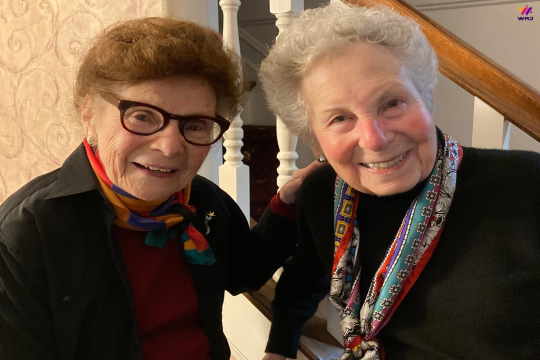Nitzavim holds a lot of meaning for me, personally. As a parashah that states that we were and are all standing at Sinai, it specifically includes me as a woman. It tells me that the mitzvot are mine to fulfill, not as a daughter, sister, or wife, but rather as a full-fledged member of the community. I am seen and included.
Nitzavim also gives me the confidence to go out and actively pursue the commandments. They are right here for me to do, on my own, without someone else climbing a mountain or going across the sea to bring them back for me. I am capable and responsible on my own to participate as a member of a community where the commandments are accessible to everyone.
And, I have the power and agency to make that choice. I have that power, as part of an extended community, where each of us is allowed the freedom to participate. Inclusion means that we support everyone, regardless of age, status, gender, and affiliation in following the commandments.
For several years, I have chanted the words of Nitzavim, specifically Deuteronomy 30:15-20, at the morning service on Yom Kippur. Those verses summarize everything that has come before: “See, I set before you this day life and prosperity, death and adversity… Choose life… by loving your God, heeding God’s commandments, and holding fast to God… you shall have life and long endure…” Those words were powerful when they were originally received and are powerful now.
Specifically, Nitzavim gives me, and I believe gives all of us, the authority to fully take a place within the Jewish community. Unlike other passages in Torah, it does not require or even allow me to stand on the sidelines. It does not say that I, as a not-Israelite-man, am to watch from behind a wall or a curtain or that, as a woman, I am excused from mitzvot. Nitzavim gives me the right, even the obligation, to study Torah. It gives me the right to chant Torah.
But, these rights come with responsibility. I do not espouse the idea that, when bad things happen to another person, it is solely because that person is living contrary to the commandments. There are too many examples now and throughout history where that would not appear to be the case. Rather, unfortunate circumstances are often an opportunity to offer the person a way forward. Nitzavim allows one the opportunity to improve one’s life by following the commandments, and it would seem to require me to provide assistance.
If I am to truly live and long endure, Nitzavim obligates me to act in a way consistent with the commandments. I am responsible to feed the poor and clothe the naked. I am responsible to stand up for the rights of people who are less powerful. I am responsible to welcome the stranger. I have been, and continue to be, responsible to empower other people to reach their potential through the work that I have done and continue to do. Also, we in WRJ are offered this opportunity to work together through the support of WRJ’s programs and the YES Fund.
We are entering a new year, 5782. In addition to wishing you a good and sweet year, an easy fast, and to be written for a blessing in the book of life, I wish you the opportunity to feel encouraged, supported, and, especially, included by the words of Nitzavim.
Related Posts

Andrea Stillman: A WRJ Leadership Spotlight



